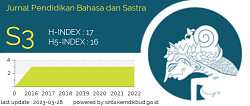EFL Students' Experience in Speaking Practice on Discord Application
Abstract
Being fluent in a foreign language requires many practices. However, Indonesian EFL learners might find it challenging to find a speaking partner to practice with as English is not widely used in the society. Moreover, the outbreak of Covid-19 has restricted people to communicate face to face, thus they seek for alternative modes of communication utilizing technology. This study was conducted in order to provide a detailed account and explanation of how learning English informally through a social media called Discord could be a better alternative to practice speaking English. The study involved two EFL students with different background based on their reason of joining the application. Narrative inquiry was used as the method of the study with data collected from interviews and observations to gather the stories on how they practiced their English in the application. The stories were then retold in a narrative account which then validated by the participants. The result includes a detailed account of the experience of practicing English in informal settings with an explanation of how these experiences reflected on the factors affecting speaking skill and ways to develop the three main aspects of speaking. With the results, Discord application shows the possibility to be an alternative for EFL students in finding a place and partners to practice their speaking.
Keywords
Full Text:
PDFReferences
Albino, G. (2017). Improving speaking fluency in a task-based language teaching approach: the case of EFL learners at puniv-cazenga. SAGE Open 7(2). pp. 1-11.
Bahrani, T., & Sim, T. (2012). Informal language learning setting: technology or social interaction? Turkish Online Journal of Educational Technology, 11(2), pp. 142-149.
Bell, J. & Waters, S. (2014). Doing Your Research Project: A Guide for First-Time Researchers (6th edn). Maidenhead: Open University Press.
Brown, D. (2001). Teaching by Principles: An Interactive Approaach to Language Pedagogy. 2nd Edition. Longman.
Getie, A. S. (2020). Factors affecting the attitudes of students towards learning English as a foreign language. Cogent Education, 7(1), pp. 1-37.
Latha, B. M., & Ramesh, P. (2012). Teaching English as a second language: factors affecting learning speaking skills. International Journal of Engineering Research & Technology (IJERT), 1(7), pp. 1-6.
Lightbown, P.M., & Spada, N. (2001). How Languages are Learned (2nd edn), Oxford: Oxford University Press.
Liu, M., & Jackson, J. (2008). An exploration of chinese EFL learners' unwillingness to communicate and foreign language anxiety. The Modern Language Journal, 92(1), pp. 71-86.
Narzullaev, K. R. (2015) Accuracy and fluency in language teaching. Young Scientist, 12(92), pp. 939-941.
Nillo, J. (2014). Factors affecting speaking skills. Retrieved from https://www.slideshare.net/
Putri, M & Pedo, V & Pawestri, N. (2019). Analyzing the factors influencing students’ fluency in English speaking skills: A case in bina nusantara university. International Conference on Language and Language Teaching (ICLLT). Magelang, Indonesia. https://eudl.eu/doi/10.4108/eai.12-10-2019.2292184
Shumin, K. (2002). Factors to Consider: Developing Adult EFL Students' Speaking Abilities. In J. Richards & W. Renandya (Eds.), Methodology in Language Teaching: An Anthology of Current Practice. Cambridge: Cambridge University Press.
Song, D., & Lee, J. (2014). Has Web 2.0 revitalized informal learning? The relationship between Web 2.0 and informal learning. Journal of Computer Assisted Learning, 30(6), 511-533.
Rogers, A. (2004). Looking again at non-formal and informal education - towards a new paradigm. Retrieved from www.infed.org/
Ugli, T. G. E. (2018). The importance of accuracy and fluency in english language. Eurasian Scientific Journal: Pedagogical Sciences (7).
Wu, J. G. & Miller, L. (2020). Improving English learners' speaking through mobile-assisted peer feedback. RELC Journal, 51(1), pp. 168-178.
Wulanjani, A.N. (2018). Discord application: turning a voice chat application for gamers into a virtual listening class. English Language and Literature International Conference (ELLiC) 2, pp. 115-119.
Yahya, M. (2013). Measuring speaking anxiety among speech communication course students at the Arab American University of Jenin (AAUJ). European Social Sciences Research Journal, 1(3), 229-248.
DOI: https://doi.org/10.17509/bs_jpbsp.v22i1.47651
Refbacks
- There are currently no refbacks.
Copyright (c) 2022 Jurnal Pendidikan Bahasa dan Sastra
p-ISSN 1412-0712 | e-ISSN 2527-8312
JPBS is published by:
Fakultas Pendidikan Bahasa dan Sastra (Faculty of Language and Literature Education), Universitas Pendidikan Indonesia,
in cooperation with
TEFLIN, and APPBIPA


